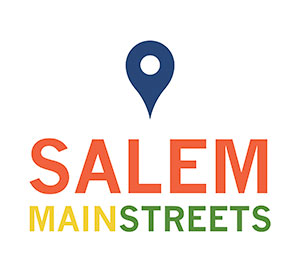
The CARES Act was passed at the federal level on March 27, 2020, and for the past 24 hours we have been hearing understandable confusion from the business community as they try to understand what it all means and what they should be doing. Here are some of the different components of the CARES Act that we at Salem Main Streets feel might directly apply to Salem’s small businesses and businessowners. You can also see our full list of COVID-19 resources here.
NOTE: This should NOT be considered a definitive guide or expert advice – this is simply the best we have been able to do with the information currently available to try and boil it down to the basics. Very few agencies or lenders will have had time to react to this information yet, so please be patient as they try to catch up in the next week. We also anticipate that far better resources will be available in the coming week to help you navigate these new laws and opportunities, which we will share as we find them.
Paycheck Protection
- 100% federally guaranteed loans to small businesses who maintain their payrolls during the COVID-19 crisis to be used for payroll, mortgage interest, and other qualified expenses
- Loans may be forgiven if borrowers maintain their payrolls during the crisis or restore their payrolls afterward.
- Eligible if you are:
- A small business with fewer than 500 employees
- A small business that otherwise meets the SBA’s size standard
- A 501(c)(3) with fewer than 500 employees
- An individual who operates as a sole proprietor
- An individual who operates as an independent contractor
- An individual who is self-employed who regularly carries on any trade or business
- A Tribal business concern that meets the SBA size standard
- A 501(c)(19) Veterans Organization that meets the SBA size standard
- Lenders offering these loans have not yet been listed, but my understanding is that it would be any bank that currently offers SBA 7(a) Loans
- Best resource with far more detail – https://www.uschamber.com/sites/default/files/023595_comm_corona_virus_smallbiz_loan_final_revised.pdf
Changes/expansions to the SBA Economic Industry Disaster Loans (EIDLs)
These are the federal loans we have already been heavily promoting (https://www.sba.gov/funding-programs/disaster-assistance), only now they have been expanded with extra benefits:
- EIDLs are now also available to Tribal businesses, cooperatives, and ESOPs with fewer than 500 employees. They are also available to all non-profit organizations, including 501(c)(6)s, and to individuals operating as sole proprietors or independent contractors.
- Borrowers can now receive a $10,000 emergency grant cash advance that can be forgiven if spent on paid leave, maintaining payroll, increased costs due to supply chain disruption, mortgage or lease payments or repaying obligations that cannot be met due to revenue losses.
- Our local Small Business Development Center is probably one of the best resources to learn more about this – if you do not have a SBDC advisor yet or forgot their name, please email: Kaitlin Muldoon: kmuldoon@salemstate.edu.
***Can a business get an EIDL and a Paycheck Protection Program loan?
Yes, small businesses can get both an EIDL and a Paycheck Protection Program loan as long as they don’t pay for the same expenses. However, be sure to check with your financial advisor or lender before taking both types of loans if you are not sure of the specifics.
Relief for Existing SBA Loans
If you already HAVE an existing SBA loan, you may be eligible to have up to six months of payments covered. Contact your lender to find out more.
Business tax provisions
There is a LOT to unpack here, so my best recommendation would be to eventually discuss them with a tax professional about which might apply to your company – you should have time to do this as the dust settles. But some of the interesting highlights include:
- Businesses are eligible for an employee retention tax credit if 1.) your business operations were fully or partially suspended due to a COVID-19 shut-down order; or 2.) gross receipts declined by more than 50% compared to the same quarter in the prior year. Eligible businesses can get a refundable 50% tax credit on wages up to $10,000 per employee. The credit can be obtained on wages paid or incurred from March 13, 2020, through December 31, 2020.
- Businesses, especially those in the hospitality industry, will be able to immediately write off costs associated with improving facilities, increasing cash flow.
- The government will make a temporary exception from the excise tax normally applied to alcohol, if that alcohol was used to produce hand sanitizer in 2020.
Payments for Individuals
- Individuals who make less than $75,000 a year will receive direct payments of $1,200 per individual ($2,400 joint return)
- Plus $500 per child
- This will phase out for incomes above $75,000 ($150,000 joint filings).
Pandemic Unemployment Assistance Program
- Unemployment benefits will now extend to business owners, self-employed individuals, independent contractors, gig workers, and those with a limited work history and history of wages earned.
- To obtain pandemic unemployment insurance coverage, contact the state unemployment office: https://www.mass.gov/applying-for-unemployment-benefits
Extra Unemployment Benefits
- An additional $600 per week in unemployment from the federal government on top of whatever base amount a worker receives from the state. That boosted payment will last for four months.
- Unemployment insurance has been expanded to last 39 weeks.
Health Insurance Coverage
- All private insurance plans must cover COVID-19 treatments and vaccine
- All coronavirus tests free
Additional (smaller) changes to the previously passed Family First Coronavirus Response Act
These are finer points that primarily tweak the exact caps and parameters of how much businesses may be required to pay IF your employee meets the requirements to be covered by this law. We will post a clearer resource spelling out the corrected changes once we find one!

